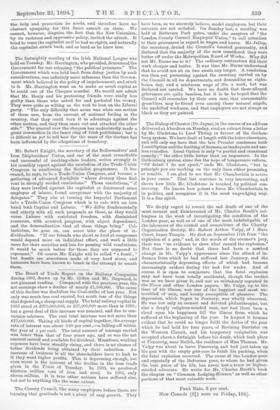We deeply regret to record the sad death of one
of the most earnest and disinterested of Mr. Charles Booth's col- leagues in the work of investigating the condition of the London poor, as well as of one of the most indefatigable of the labourers of the council and committees of the Charity Organisation Society, Mr. Robert Arthur Valpy, of 1 Hare Court, Inner Temple. He died on September 11th from "the explosion of a gun," and, in the words of the coroner's jury, there was "no evidence to show what caused the explosion." Bat there is no doubt that there had been a marked change in Mr. Valpy's appearance since the attack of in- fluenza from which he had suffered last January, and the characteristically depressing effects of which had become increasingly evident during the last few weeks. And of course it is open to conjecture that the fatal explosion may not have been totally accidental, though the verdict was as we have given it, and not as mistakenly reported in the Times and other London papers. Mr. Valpy, up to the time of his illness, was one of the happiest and most un- troubled of men, and keenly susceptible of pleasure. The depression, which began in January, was wholly abnormal. He was not only an earnest and devoted philanthropist, bat also a deeply religious-minded man, nor had there been a cloud upon his happiness till the illness from which he suffered at the beginning of the year. In August it became evident that he could no longer fulfil the duties of the post which he had held for four years, of Revising Barrister on the Western Circuit, and his temporary resignation was accepted about a fortnight before his death, which took place at Pencerrig, near Builth, the residence of Miss Thomas. Mr. Valpy was about to leave Pencerrig, and had just taken up his gun with the empty gun-case to finish his packing, when the fatal explosion occurred. The cause of the London poor and especially of the Battersea poor, to whom he had given the best years of his life, has never lost a truer or higher- minded advocate. He wrote for Mr. Charles Booth's book the chapter on " Common Lodging-Houses," as well as other portions of that most valuable work.


































 Previous page
Previous page